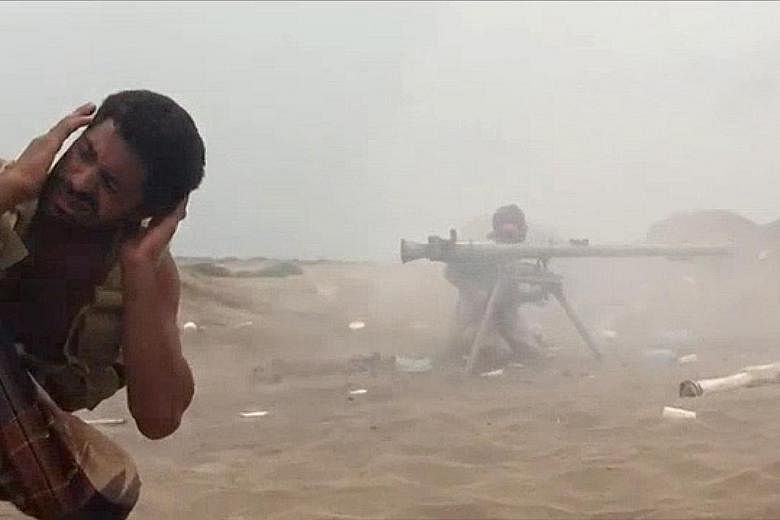ADEN • Saudi-led coalition aircraft bombarded Houthi fighters holed up at the airport of Yemen's main port Hodeida yesterday as UN efforts for a ceasefire appeared to fizzle out, raising fears for civilians as pro-government forces pressed their offensive to retake the key rebel-held city.
After two days of talks in the capital Sanaa, UN envoy Martin Griffiths was due to brief the Security Council on his efforts to end the crisis in Hodeida, a key entry point for desperately-needed aid in a country on the brink of famine.
But the Iran-backed Houthi rebels said the talks had failed, and the head of their unofficial government rejected a ceasefire under current conditions after meeting Mr Griffiths on Sunday.
Mr Abdulaziz Saleh bin Habtoor accused Saudi-led forces of "escalating their attacks on the western coast when they felt there were serious moves towards a solution".
Apache helicopter gunships fired at Houthi snipers and other fighters positioned on the rooftops of schools and homes yesterday in the Manzar neighbourhood, abutting the airport compound, according to local residents.
Civilian deaths have not yet been confirmed in Hodeida. The conflict has killed at least 139 fighters, mostly rebels, according to medical and military sources.
The Western-backed Arab alliance launched an onslaught on Hodeida six days ago in order to turn the tables in a long stalemated proxy war between Saudi Arabia and Iran that has compounded instability across the Middle East.
The United Arab Emirates (UAE), a key component of the coalition, is spearheading the Hodeida offensive, now focused on the airport of the Red Sea city. Loyalist forces in recent days closed in on areas south and west of the port, advancing on a disused rebel-held airport just south of the docks, said sources in the Yemeni army.
Losing Hodeida would seriously weaken the Houthis by severing supply lines from the Red Sea to their stronghold in the capital Sanaa.
It could also give an edge to the Western-backed coalition that, despite superior weapons and firepower, has failed to defeat the Houthis in a war that has killed at least 10,000 people and created the world's most urgent humanitarian crisis.
Some 22 million people need aid, while 8.4 million are on the brink of starvation, the United Nations said.
UN human rights chief Zeid Ra'ad al-Hussein yesterday told the opening of a three-week session of the world body's Human Rights Council in Geneva: "I emphasise my grave worry regarding the Saudi and Emirati-led coalition's ongoing attacks in Hodeida - which could result in enormous civilian casualties and have a disastrous impact on life-saving humanitarian aid to millions of people which comes through the port."
A senior UAE official said the coalition would take a "calculated and gradual" approach to the battle to minimise risks to civilians.
UAE minister of state for foreign affairs Anwar Gargash said the Houthis' days in Hodeida "are numbered", and he hoped Mr Griffiths could convince them to cede control of the major Red Sea port.
"We are still counting on the UN attempt to pull a rabbit out of the hat," Mr Gargash said.
He estimated the number of Houthi fighters in Hodeida at between 2,000 and 3,000. He declined to reveal the size of coalition forces, but said they had "numerical superiority".
REUTERS, AGENCE FRANCE-PRESSE

